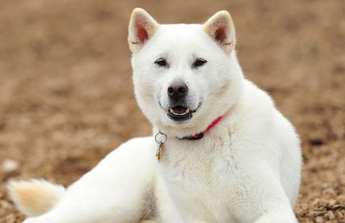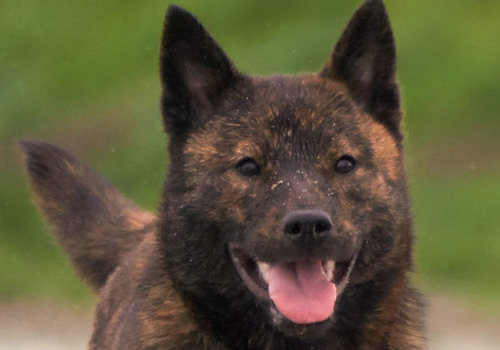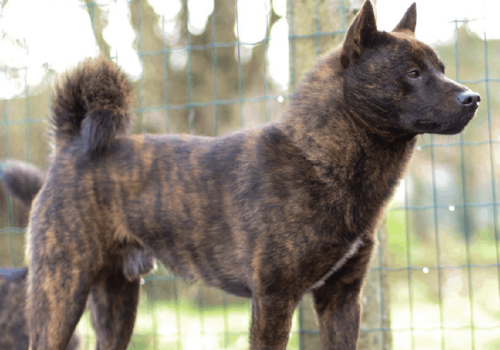Kai Ken has a medium-length double coat. They are a naturally clean dog that only requires the occasional bath.
Being a double-coated breed, they do lose their undercoat twice a year. During this time, additional bathing and brushing will help remove the thick undercoat. When not shedding their undercoat, occasional brushing will keep their coat in good condition.
Their nails should be trimmed regularly with a nail clipper or grinder to avoid overgrowth, splitting, and cracking. Their ears should be checked regularly to avoid a buildup of wax and debris, which can result in infection. Teeth should be brushed regularly.
As a hunting breed, the Kai Ken is fairly active but the breed only has moderate needs for exercise. You will not need to take your dog out for hours every day – a long 30-minute walk or a brisk jog will be adequate.
This breed is adaptable to apartment life and can get along without a yard as long as its daily exercise needs are met. Because this breed is so intelligent, it requires frequent mental exercise as well as physical exercise to engage your dog in games often and consider agility training to keep him sharp and active.
Given that the Kai Ken is a naturally active breed, you should consider providing him with a dog food formulated for active dogs. They should do well on high-quality dog food, whether commercially manufactured or home-prepared with your veterinarian’s supervision and approval.
Any diet should be appropriate to the dog’s age (puppy, adult, or senior).Treatscan be an important aid in training, but giving too many can cause obesity. Learn about whichhuman foodsare safe for dogs, and which are not.
Kai Ken is a breed known to self-regulate their food intake, so it is not unusual to see variability in the quantity of food consumed. Check with your vet if you have any concerns about your dog’s weight or diet.Clean, fresh water should be available at all times.
Kai Ken is an overall healthy breed, andresponsible breedersscreen their stock for health conditions such as allergies, luxating patella, and seizures.Those wishing to own a Kai Ken can work with a responsible breeder to gain the education they need to know about specific health concerns within the breed.
Originally bred to hunt boar and deer, the Kai Ken makes a great hunting dog. These dogs are highly intelligent and respond very well to training, especially if it is started at an early age.
This breed learns very quickly, so if you provide firm and consistent training you may be amazed at how much this dog can learn and retain. The Kai Ken is not as independent or strong-willed as some highly intelligent breeds – they have a natural desire to please their human companions.
What's more, positive training methods should be used. Early training is encouraged to establish a solid foundation and also offer socialization. Due to the strong desire to hunt, it is not recommended that Kai Ken be allowed off-leash in unfenced areas.











